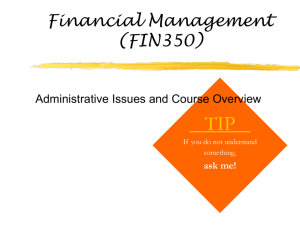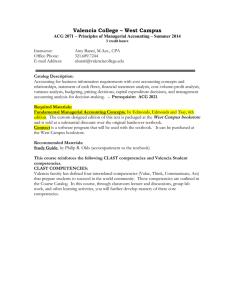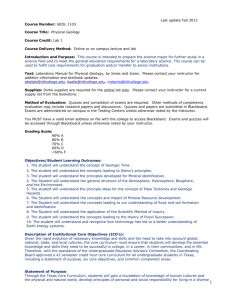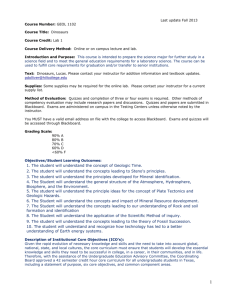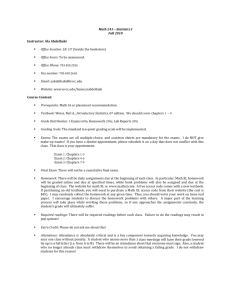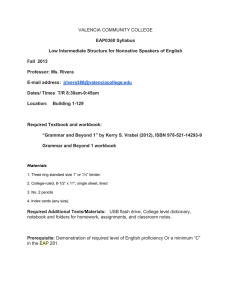Managerial Accounting
advertisement
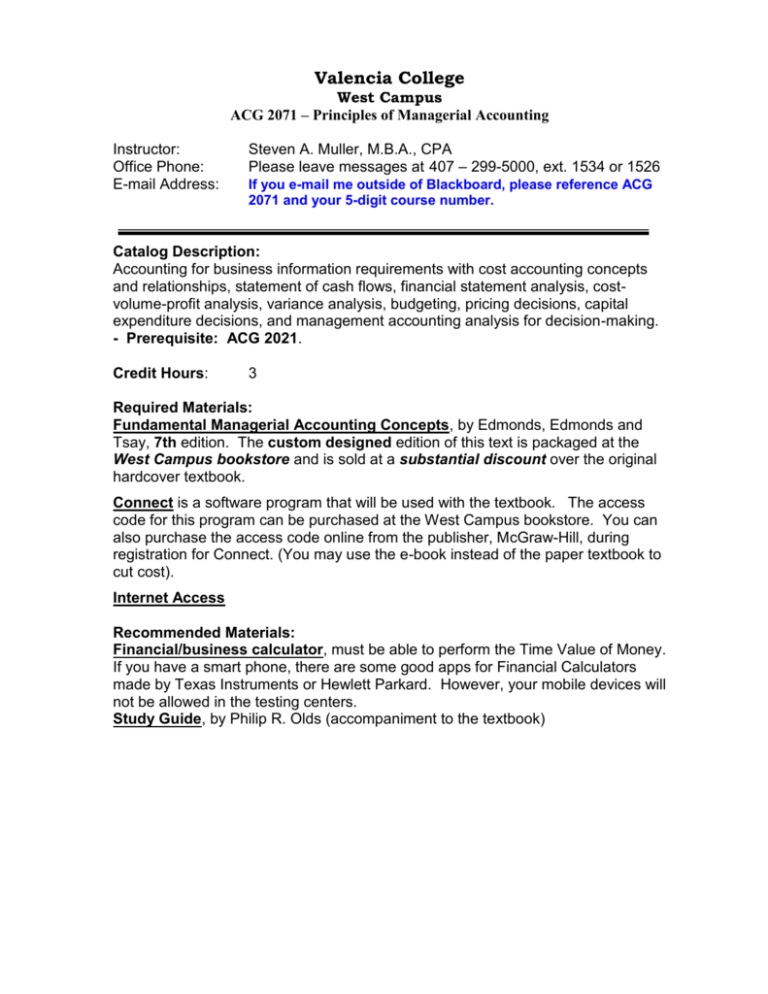
Valencia College West Campus ACG 2071 – Principles of Managerial Accounting Instructor: Office Phone: E-mail Address: Steven A. Muller, M.B.A., CPA Please leave messages at 407 – 299-5000, ext. 1534 or 1526 If you e-mail me outside of Blackboard, please reference ACG 2071 and your 5-digit course number. Catalog Description: Accounting for business information requirements with cost accounting concepts and relationships, statement of cash flows, financial statement analysis, costvolume-profit analysis, variance analysis, budgeting, pricing decisions, capital expenditure decisions, and management accounting analysis for decision-making. - Prerequisite: ACG 2021. Credit Hours: 3 Required Materials: Fundamental Managerial Accounting Concepts, by Edmonds, Edmonds and Tsay, 7th edition. The custom designed edition of this text is packaged at the West Campus bookstore and is sold at a substantial discount over the original hardcover textbook. Connect is a software program that will be used with the textbook. The access code for this program can be purchased at the West Campus bookstore. You can also purchase the access code online from the publisher, McGraw-Hill, during registration for Connect. (You may use the e-book instead of the paper textbook to cut cost). Internet Access Recommended Materials: Financial/business calculator, must be able to perform the Time Value of Money. If you have a smart phone, there are some good apps for Financial Calculators made by Texas Instruments or Hewlett Parkard. However, your mobile devices will not be allowed in the testing centers. Study Guide, by Philip R. Olds (accompaniment to the textbook) Office Hours: This course reinforces the following CLAST competencies and Valencia Student competencies. CLAST COMPETENCIES: Valencia faculty has defined four interrelated competencies (Value, Think, Communicate, Act) that prepare students to succeed in the world community. These competencies are outlined in the Course Catalog. In this course, through classroom lecture and discussions, group lab work, and other learning activities, you will further develop mastery of these core competencies. VALENCIA STUDENT COMPETENCIES: The following Valencia Student Competencies will be reinforced throughout the entire course. THINK - Think clearly, critically, and creatively. Analyze, synthesize, integrate, and evaluate in many domains of human inquiry. To think, what must you do? Analyze data, ideas, patterns, principles, and perspectives Employ the facts, formulas, and procedures of the disciplines Integrate ideas and values from different disciplines Draw well-supported conclusions Revise conclusions consistently with new observations, interpretations, or reasons How and where must you think? With curiosity and consistency Individually and in groups VALUE - Make reasoned value judgments and responsible commitments To value, what must you do? Recognize the values expressed in attitudes, choices, and commitments Distinguish among personal, ethical, aesthetic, cultural, and scientific values Employ values and standards of judgment from different disciplines Evaluate your own and others' values from individual, cultural, and global perspectives Articulate a considered and self-determined set of values How and where must you value? With empathy and fair-mindedness Individually and in groups COMMUNICATE To communicate, what must you do? Identify your own strengths and need for improvement as communicator Employ methods of communication appropriate to your audience and purpose Evaluate the effectiveness of your own and other's communication How and where must you communicate? By speaking, listening, reading and writing Verbally, non-verbally, and visually With honesty and civility ACT - Act purposefully, respectfully, and responsibly To act, what must you do? Apply disciplinary knowledge, skills, and values to educational and career goals Implement effective problem-solving, decision-making, and goal setting strategies Act effectively and appropriately in various personal and professional settings Assess the effectiveness of personal behavior and choices Respond appropriately to changing circumstances How and where must you act? With courage and perseverance Individually and in groups In your personal, professional, and community life CALENDAR HIGHLIGHTS ACG 2071C - MANAGERIAL ACCOUNTING FALL 2015 Week Ending Material 5-Sep Week 1 Chapter 1 12-Sep Week 2 Chapter 1 19-Sep Week 3 Chapter 2 26-Sep Week 4 Chapter 2 3-Oct Week 5 Chapter 3 10-Oct Week 6 Chapter 4 17-Oct Week 7 Chapter 5 Exam 1 - 3 24-Oct Week 8 Chapter 6 31-Oct Week 9 7-Nov Week 10 Chapter 7 Chapters 7 Exam Ch 4 - 6 14-Nov Week 11 Chapters 8 21-Nov Week 12 28-Nov Week 13 Chapters 9 Chapters 9 Exam Ch 7 - 8 5-Dec Week 14 Chapters 10 12-Dec Week 15 Chapters 10 Final Exam 19-Dec Week 16 Final Exam Grading Composition: First 3 Exams Final Exam Group (Home) Work Chapter Quizzes Points 480.00 Percent 48.00% Scale A= 220.00 150.00 150.00 1,000.00 22.00% 15.00% 15.00% 100.00% B= C= D= F= 90% + 80% - 89% 70% - 79% 60% - 69% Below 60% Withdrawal Policy: A student is permitted to withdraw from a class on or before the withdrawal deadline as published in the College calendar. A student is not permitted to withdraw from a class after the withdrawal deadline. The professor is permitted to withdraw a student from the class for violation of the professor’s attendance policy with written notification to the student prior to the beginning of the final exam period as published in the faculty member’s syllabus. A student who withdraws from a class before the withdrawal deadline will receive a grade of "W." A student who is withdrawn by a professor will receive a grade of "W." A student who is withdrawn for administrative reasons at any time will receive a grade of "W" or other grade as determined in consultation with the professor. Any student who withdraws or is withdrawn from a class during a third or subsequent attempt in the same course will be assigned a grade of "F". The grades of “WP” and “WF” are eliminated. Final course grades of "A", "B", "C", "D", or "F" shall be assigned based upon the student's academic achievement upon the completion of all course work, including the required final examination. A student who fails to take the required final examination may receive a final course grade earned, unless the professor elects to assign the student a grade of "I" or as otherwise addressed in the Professor’s course syllabus. CLASS POLICIES: 1. Attendance: If you do not attend, as described below, for two consecutive weeks, you are subject to withdrawal. Attendance is recorded each time that you log into Blackboard platform (minutes are recorded). The academic week is Monday-Sunday by midnight (Eastern Time). To receive full credit for attending your class, you must attend weekly AND at least one of the following items must be completed each week as directed by the instructor: 1. Submit an academic assignment. 2. Submit a quiz or exam. 3. Participate in a posted online academic discussion. If the syllabus notes additional activities that must be completed during a given week or time period for the student to be viewed as having “attended” the course, those instructions apply in addition to the minimal requirements listed above. NOTE: Logging into class without active participation does not constitute weekly attendance Participation in assignments and course activities count towards attendance. The online course environment weeks run from Monday at 12:00am EST to Sunday at 11:59pm EST. Assignments done in a week other than the one when the assignment is due will not count towards attendance for the previous or a future week. Students are strongly encouraged to log in more in order to understand the subject fully and to be successful in class. 2. A student is responsible for all scheduled assignments and tests. Make-ups for scheduled tests must be requested before the test date and are subject to approval of the instructor. 3. Students who plagiarize or cheat, in anyway, on an exam risk dismissal from the class and expulsion from the college. 4. Students must have an active Atlas account. Students must check their Atlas and Blackboard e-mails regularly as to not miss any important messages from the professor. 5. Missed messages via Atlas, Blackboard or any other medium may affect your grade and are the responsibility of the student. 6. Students with disabilities who qualify for academic accommodations must provide a letter from the Office for Students with Disabilities (OSD) and discuss specific needs with the professor, preferably during the first two weeks of class. The Office for Students with Disabilities determines accommodations based on appropriate documentation of disabilities (West Campus SSB 102, ext. 1523). 7. Anything that is deemed disturbing to the students or instructor will not be allowed in our online environment. If a disturbance occurs, the violator will have 50 points deducted from their final course grade for each occurrence. Continual disturbances will be grounds for removal from the course. Quizzes & Homework: Accounting is learned by understanding the concepts involved and applying those concepts in practice problems. Thus to master this course, you need to 1. Read the material before completing the homework, 2. Complete homework assignments and participate in discussions, 3. Complete the assigned quizzes. All of the Quizzes and Homework assignments are open starting at the first day of the course. Feel free to work ahead of the course calendar. Exams: There will be three proctored exams before the proctored final exam. (You may use any of our testing centers on our five campuses to take your exams). If your final exam grade is higher than the previous exams, then that lowest grade exam will be increased to match your final exam grade. A missed exam will count as a dropped exam. Because of this policy, there are no makeup exams in this class. Extra Credit: Extra Credit Quizzes are optional yet highly recommended. To earn the extra credit points, you must answer all questions in the quiz through Blackboard by the due date posted. No late submissions will be accepted for extra credit. You may take these quizzes unlimited times until the evening of the due date. Your highest grade will provide you with extra credit points. If the highest grade for all extra credit quizzes is 100%, then you earned an extra 50 points on top of your final grade. Lower grades for each quiz will prorate the 50 extra credit points. If the Extra Credit was included in the Grading Composition above, then the total percentage would be 105%. Discussion forum: “Befuddling Questions” will be used for extra credit points. The first student to answer another’s Accounting question completely and accurately will earn extra credit in their final group work grade. Academic Honesty Policy: All forms of academic dishonesty are prohibited at Valencia College. Academic dishonesty includes, but is not limited to, plagiarism, cheating, furnishing false information, forgery, alteration or misuse of documents, misconduct during a testing situation, and misuse of identification with intent to defraud or deceive. A first incident of academic dishonesty may result in Zero or ‘F’ on the assignment that contains the copied or plagiarized information for all people involved. A second offense may result in an ‘F’ in the course. NO-SHOW PROCEDURE Any student who does not attend class prior to the start of the no-show period for each part of term will be withdrawn by the instructor as a no-show. This will count as an attempt in the class, and students will be liable for tuition. If your plans have changed and you will not be attending this class, please withdraw yourself through your Atlas account during the drop period for this part of term. Disclaimer: THE INSTRUCTOR RESERVES THE RIGHT TO MAKE CHANGES TO THE SYLLABUS. CHANGES WILL BE ANNOUNCED IN CLASS. A Method of Study: No one can adequately prepare for a journey without first consulting road maps and travel guides. In the same way, no one can prepare for a textbook without first pre-reading the material. The following is a method of study: 1. Examine the outside references of a textbook. The title tells you what the text is about, and the blurb on a book gives your more of a synopsis of the material. 2. Scan over the index in the back of a book. The topics with the most references expose an author’s biases. It shows the priority of concerns to the author. 3. Read the author’s preface. This section reveals the author’s philosophy in presenting the course material. What is his/her objective with the current book. 4. The Table of context shows the structure the author is using to achieve his/her objective. A well-prepared table of context also supplies the major topics of the text. These topics provide reference points on the road to mastering the text. 5. Use the subtopics revealed in each chapter. These subtopics are usually presented as Chapter Objectives, Chapter Summaries, Section Headings (usually in bold face fonts), and questions at the end of each chapter. a. Turn each subtopic into a question by using the words: who, what, where, when, why and how. b. With a highlighter in hand, read through the text searching for the answer to this question. When the answer is discovered, highlight the answer and move on to your next question. c. After completing the chapter, close the book and trying writing out the answers to your questions. This becomes your first test on the material. When finished, compare your answers to the highlighted answers in the text. Correct any errors made. Then turn your paper over and retake the questions answered incorrectly. d. For each question, try to find the key word or phrase in the answer. This key word or phrase can be used in your notebook and index cards for a quick review of the material. For further instructions on reading different types of books / textbooks please refer to “How to Read A Book” by Mortimer Adler.


